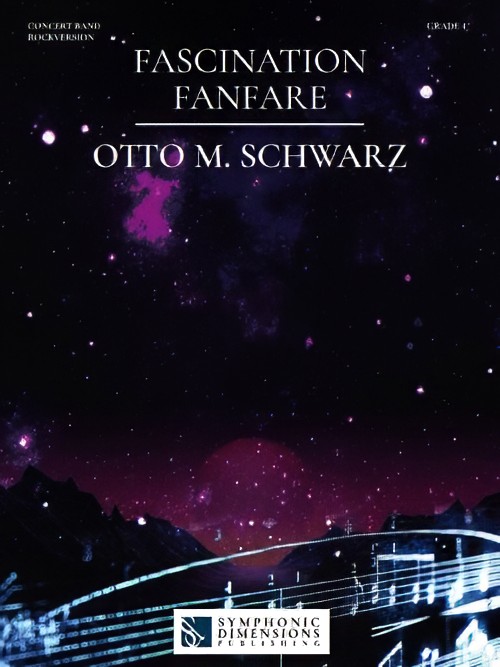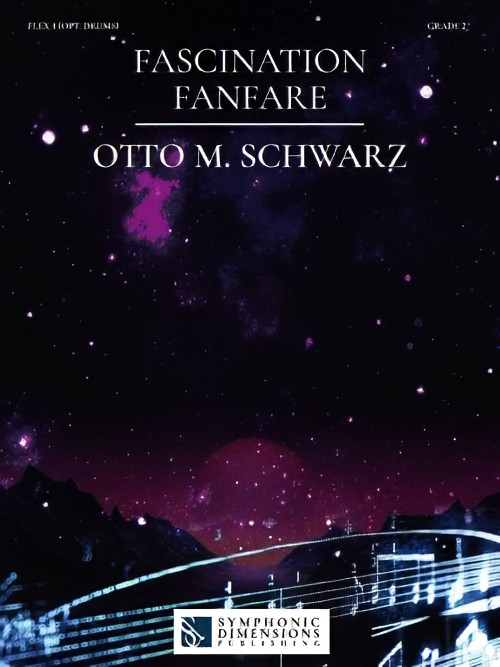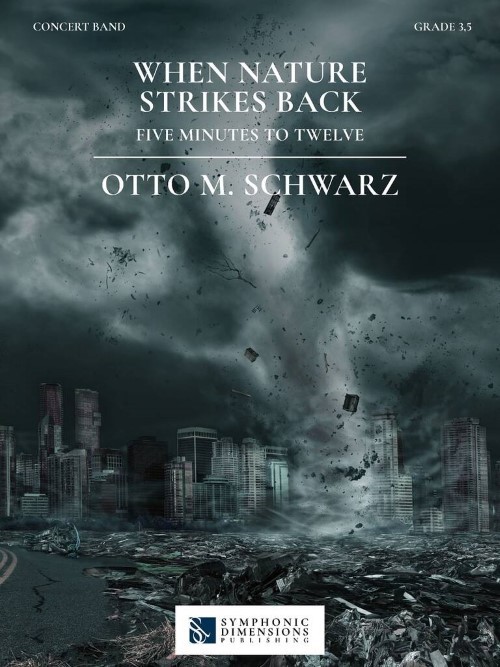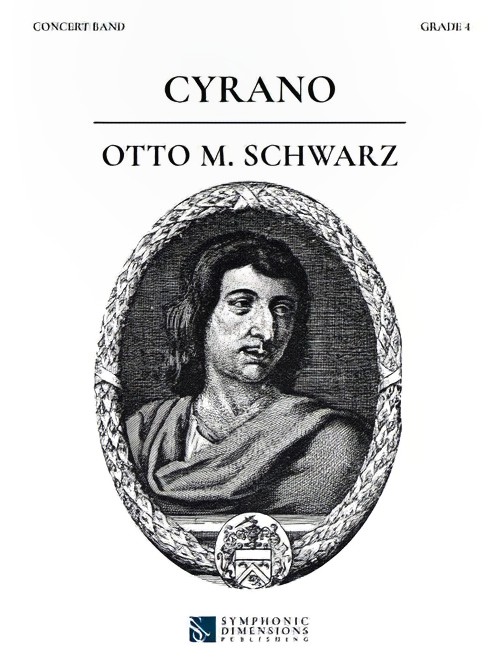Results
-
 £159.99
£159.99Mantua (Concert Band - Score and Parts)
The city of Mantua holds significant historical importance for the southern Italy's region of Tyrol. In this dramatic work Otto M Schwarz tells the tale of the Tyrolian freedom fighter Andreas Hofer who was executed in Mantua in 1809. The composer follows the life of this great folk hero, from his humble beginnings as an innkeeper to his death. This piece has all the energy of an exciting adventure movie - just without the pictures, of course! 14:00
Estimated dispatch 7-14 working days
-
 £159.99
£159.99Nostradamus (Concert Band - Score and Parts)
Nostradamus is probably the best-known prophet of the last 1000 years. He lived at the time of the Inquisition and his predictions and medical therapies as a physician caused him to face the wrath of the church forcing him to flee many times. Following the loss of his family to the plague he devoted himself to clairvoyancy. He predicted many events in history in coded form and although there are many ways to interpret these, many are believed to be accurate and Nostradamus is still considered to be a unique personality. Whether he is denounced as a charlatan or promoted as a myth he has surely moved humankind with his prophecies.Otto M. Schwarz, soundtrack composer since 2001, wrote a cinematographic work about this man, who is probably the best-known prohet of the last 1000 years. 12:30
Estimated dispatch 7-14 working days
-
 £94.99
£94.99Ready - Steady - Brass! (Concert Band - Score and Parts)
Ready - Steady - Brass! is one of a number of successful works by Otto M. Schwarz such as Last Call, Funky Winds, Glory Fanfare and Groove Machine. Starting with a fanfare-style opening the music takes a journey through melodic sections and technical, soloistic passages to a grandiose finale.
Estimated dispatch 7-14 working days
-
 £149.99
£149.99The Count of Monte Cristo (Concert Band - Score and Parts)
This fantastic new concert work by Otto M. Schwarz is based on the infamous tale of The Count of Monte Christo. Set in 1815 - a few days before Napoleon invaded France, the story is one of adventure on the high seas, spying, buried treasure and savage revenge. So many emotions in one fantastic concert work - this piece is sure to be a winner.
Estimated dispatch 7-14 working days
-
 £84.99
£84.99The Sound of my Life Wind Band Set (Score & Parts)
With this composition, Otto M. Schwarz shows himself totally capable of composing a work with a somber, almost melancholic character. Melody and counterpoint, accompanied by a peaceful harmony, play a kind of question and answer game in this short composition. The piece is written in a rather ABA form, with the perusiion complementing the whole very effectively. 0:03:00
Estimated dispatch 7-14 working days
-
 £248.99
£248.99The White Tower (Concert Band - Score and Parts)
The year is 1798 and thieves, robbers, and bandits prowl the countryside, wreaking havoc wherever they go and more often than not escaping without so much as a scratch. This was, however, not the case with a supposedly well-planned assault on the German town of Daaden, during which 20 long sought-after crooks from Germany, France, and Holland where captured. Otto M. Schwarz' exciting musical montage lets people experience the planning, assault, and attempted retreat first hand! 20:05
Estimated dispatch 7-14 working days
-
 £100.80
£100.80Fascination Fanfare (Concert Band - Score and Parts) - Schwarz, Otto M.
Rock VersionFascination Fanfare is a hymn to passion, to fascination and to generations of music lovers! This dynamic fanfare is a rousing work full of catchy melodies and enthralling sounds. This opening work and the musical signature tune it contains were commissioned by the Austrian Brass Band Association and will be heard, among other things, at public events as a musical calling card.Duration: 3.15
Estimated dispatch 7-14 working days
-
 £63.99
£63.99Fascination Fanfare (Flexible Ensemble - Score and Parts) - Schwarz, Otto M.
Fascination Fanfare is a hymn to passion, to fascination and to generations of music lovers! This dynamic fanfare is a rousing work full of catchy melodies and enthralling sounds. This opening work and the musical signature tune it contains were commissioned by the Austrian Brass Band Association and will be heard, among other things, at public events as a musical calling card.Duration: 3.00
Estimated dispatch 7-14 working days
-
 £139.99
£139.99When Nature Strikes Back (Concert Band - Score and Parts) - Schwarz, Otto M.
Ice ages, warm periods, impacts by asteroids - the climate on our planet has always been in a state flux. The difference to the past is that since the industrial revolution, the changes are now also increasingly caused by human activity. The release of greenhouse gases in particular promotes the warming of the atmosphere and the oceans. Some experts even predict an increase of up to 4.8 degrees by the end of the 21st century. The result of such a development, apart from environmental catastrophes that are difficult to predict, would be a gigantic migration of populations. CO2 emissions must be reduced: it is five minutes to twelve. The harbingers of disaster have already reached us.Duration: 8.00
Estimated dispatch 7-14 working days
-
 £139.99
£139.99Cyrano (Concert Band - Score and Parts) - Schwarz, Otto M.
What are the true qualities of a person? Outward beauty or inner values? Or perhaps a balance of the two? This question has probably been posed by everyone at some time or another, and the answer is as challenging as it is subjective. This is also the theme of this work. The poet and soldier Cyrano de Bergerac is known for his big nose and his great intellect. The 17th century novelist harbours feelings for the beautiful Roxane but is sure that this love will never be reciprocated. Roxane herself falls in love with the cadet Christian de Neuvillette, who is certainly handsome but could be described as stupid. Cyrano de Bergerac writes love poems on behalf of Christian to win Roxane's heart. And then there is the Count Guiche, who is married but also wants to make her his mistress. Christian and Roxane eventually marry and the furious Count Guiche sends Christian and Cyrano, who serve together in the Captains of Gascony regiment, to the front and, some months later, on a suicide mission. Shortly before the battle, Roxane confesses to her husband that she no longer loves him so much for his beauty as for his inner values. Christian is dismayed and begs Cyrano to tell Roxane the truth, but he can't bring himself to do so. Christian de Neuvillette dies in battle and Cyrano de Bergerac remains silent about the true provenance of the letters. Only much later does the truth come to light: scarred by the war, Cyrano visits Roxane in the convent where she has been living since Christian's death and confesses his love for her. He ultimately dies in Roxane's arms.Duration: 8.30
Estimated dispatch 7-14 working days
